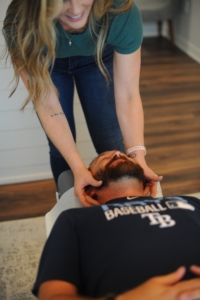Can Chiropractic Care Help Vertigo?
Today, we’re delving into an important topic that affects many individuals: vertigo. If you’ve ever experienced the disorienting sensation of spinning or dizziness, you know just how disruptive it can be to your daily life. But the good news is that chiropractic care might hold the key to finding relief from vertigo.

In this comprehensive blog post, we’ll explore what vertigo is, its potential causes, and how chiropractic care can make a significant difference in your battle against this unsettling condition.
Understanding Vertigo
Before we dive into the role of chiropractic care in managing vertigo, let’s establish a solid understanding of what vertigo is and its potential causes:
- What is Vertigo?
- Vertigo is a condition characterized by a false sense of spinning or movement.
- It can feel like you or your surroundings are rotating or swaying when, in reality, they are not.
- Vertigo is often accompanied by nausea, vomiting, and an overall feeling of unsteadiness.
- Common Causes of Vertigo
- Inner ear problems: Conditions like benign paroxysmal positional vertigo (BPPV) or Meniere’s disease can lead to vertigo.
- Vestibular neuritis or labyrinthitis: Infections or inflammation of the inner ear can result in vertigo.
- Head injuries or trauma: Past head injuries can trigger vertigo symptoms.
- Medications: Certain medications may have vertigo as a side effect.
- Migraines: Some individuals experience vertigo during migraines.

Chiropractic Care and Vertigo
Now that we have a clear understanding of vertigo, let’s explore how chiropractic care can play a pivotal role in managing this condition.
- The Connection Between the Spine and Balance
- Chiropractic care focuses on the spine, which is intricately connected to your body’s overall balance and coordination.
- Misalignments or subluxations in the spine can disrupt the flow of signals between the brain and body, potentially leading to balance issues and vertigo.
- Chiropractors are trained to detect and correct these spinal misalignments through manual adjustments.
- BPPV and Chiropractic Adjustments
- Benign paroxysmal positional vertigo (BPPV) is one of the most common causes of vertigo.
- BPPV often occurs due to dislodged crystals in the inner ear, causing dizziness.
- Chiropractic adjustments, such as the Epley maneuver, can help reposition these crystals, alleviating vertigo symptoms.
- Improved Blood Flow and Nerve Function
- Chiropractic adjustments enhance blood flow and nerve function throughout the body, including the inner ear.
- Improved blood circulation and nerve communication can aid in the resolution of vertigo symptoms.
- Holistic Approach to Wellness
- Chiropractic care doesn’t merely focus on symptom relief; it emphasizes the holistic well-being of the patient.
- Chiropractors assess your overall health, including lifestyle, diet, and stress levels, to provide a comprehensive treatment plan that addresses the root causes of your vertigo.

In conclusion, chiropractic care can indeed play a crucial role in helping individuals find relief from vertigo. By addressing spinal misalignments, enhancing blood flow and nerve function, and adopting a holistic approach to wellness, chiropractic care can significantly improve your quality of life. If you’re tired of living with the unsettling sensation of vertigo, we invite you to visit Blossom Family Chiropractic and embark on a journey towards balance, health, and vitality.
Don’t let vertigo control your life. Contact us today and take the first step towards a vertigo-free future. Chiropractic care is here to support you every step of the way.
Remember, at Blossom Family Chiropractic, your health is our priority, and we’re here to help you blossom into your best self.
Disclaimer: The information provided in this blog post is for educational purposes only and should not replace professional medical advice. If you are experiencing vertigo, please consult with a healthcare professional to determine the most appropriate treatment plan for your individual needs.



